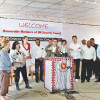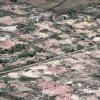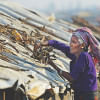Dhaka pushing for special UN session
Dhaka has intensified diplomatic efforts for the UN Human Rights Council to hold a special session and adopt a resolution on the Rohingya crisis.
Such efforts, however, need support of at least 16 of the 45 member-countries for an exclusive session of the UNHRC on any issue, diplomatic sources said.
As part of the government effort, Foreign Secretary Md Shahidul Haque briefed diplomats from the US, UK, China, Russia, India, Brazil, Canada, Denmark, France, Germany, Italy, Netherlands, Norway, Spain, Sweden, Switzerland, Turkey and Vatican yesterday morning.
Senior foreign ministry officials were also present during the briefing.
The foreign secretary also held an exclusive meeting with Saudi Ambassador Abdullah HM Al-Mutairi on the Rohingya issue.
During the briefing, foreign diplomats sought to know Dhaka's short, mid and long-term plans for the crisis.
In reply, officials said Bangladesh was focusing on immediate solution and wanted to see the Rohingyas taken back to their homeland as soon as possible, foreign ministry sources said.
More than 600,000 Rohingyas entered Bangladesh since August 25. They are mostly children, women and elderly people.
CHINA FOR PEACEFUL SOLUTION
China wants to see a peaceful solution to the Rohingya crisis, foreign ministry officials said yesterday.
"Their intention and commitment for sending them [Rohingyas] back is now stronger," the foreign secretary told reporters quoting Chinese special envoy of Asian Affairs, Sun Guoxiang, after their meeting.
He said Dhaka informed the Chinese envoy when he came here six months ago, that the number of Rohingyas was four lakh and now it stood at one million.
The foreign secretary said China was very worried about the crisis as it was not good for the region.
However, the question of China's mediation to resolve the crisis did not come up for discussion, he added.
"We sought support in the areas where we need. We're always optimistic and this time, too [regarding repatriation]," said the foreign secretary.
He said the only issue discussed at the meeting was the Rohingya issue and Bangladesh's position is to send them back safely.
"Our stance is that their nationals will have to be taken back. It's our one-point agenda. It's an unbearable burden. The prime minister allowed them to stay here on humanitarian ground. But it cannot be for long," he said.
Replying to a query about China's position on the issue, the foreign secretary said both Myanmar and Bangladesh were China's friends. "They want to bring a peaceful resolution working with the two friends."
Sun Guoxiang, who arrived in Dhaka on Wednesday, will head for Beijing this morning.
AID WORKERS BARRED
Aid workers were barred from visiting a camp for displaced Muslims in the central part of Rakhine State yesterday.
A group of about 10 Myanmar nationals, working for US and Britain- based charity Relief International (RI), were forced to turn back when residents of the mostly Buddhist ethnic Rakhine community staged a protest in the town of Myebon, a regional administrator and an activist told Reuters.
In early September, Myanmar blocked all UN aid agencies from delivering vital supplies of food, water and medicine to thousands of Rohingyas, a persecuted Muslim minority in Rakhine.
The Rohingyas, who recently entered Bangladesh, complained of food crisis in parts of Rakhine, while UN and other aid agencies and rights bodies have been demanding that they be allowed to provide emergency supplies to Rakhine.
"The RI group was trying to go to the camp and the locals blocked the way," Tin Shwe, Myebon's administrator, told Reuters, adding that the aid workers returned to their office.
Khin Thein, a leader of a regional branch of the Arakan Women's Network, said her group joined the protest after authorities told the community the NGO would provide education about gender-based violence, hygiene and sanitation to Muslims.
"They have food, they have shelter to live," she told Reuters. "We can't accept these kinds of excessive things for them.
"We will not allow them to pass through our township. We already protested several times in the past. We have suspicions about them. We don't trust foreigners, international people."
Yesterday's incident was the latest example of the numerous obstacles that humanitarian organisations face in Rakhine State, said Pierre Peron, a spokesman for the United Nations' Office for the Coordination of Humanitarian Affairs.
US MOUNTS PRESSURE ON TRUMP
US lawmakers have mounted pressure on the Trump administration to declare that ethnic cleansing is taking place against the Rohingya Muslim population in Myanmar.
Hundreds of women, children and men belonging to the Rohingya minority have been "systematically killed" and driven from their homes, their villages burned to the ground by Myanmar's military, lawmakers charged the State Department officials during a hearing.
They angrily said the US made no major change to its ties to Myanmar, and its officials have shied away from legal terms such as "ethnic cleansing" or "crimes against humanity" despite what many say is strong evidence.
"This is ethnic cleansing, it's pretty clear," said Senator Ben Cardin, a Maryland Democrat. "Yes, I think it's genocide."
Three US officials testifying at a Senate Foreign Relations Committee hearing on Tuesday declined to refer to violence against the Rohingya as "ethnic cleansing", before a complete review is announced, according to US media reports.
Senator Bob Corker, chairman of the committee, presided over the hearing. The members of the committee, including Senator Cardin, took part in the hearings on "Assessing US Policy towards Burma: Geopolitical, Economic and Humanitarian Considerations."
The officials told the lawmakers that the State Department has identified and announced new and ongoing actions to punish those who have committed atrocities.
Meanwhile, US Special Representative and Policy Coordinator for Burma (Myanmar) W Patrick Murphy said the US is working with the international community to hold accountable those responsible for atrocities in Rakhine, says a statement from the US state department.
"What I can say as a matter of policy, we've assessed that atrocities have been committed and we must pursue accountability," he said in a special briefing in Washington yesterday.

 For all latest news, follow The Daily Star's Google News channel.
For all latest news, follow The Daily Star's Google News channel. 








Comments